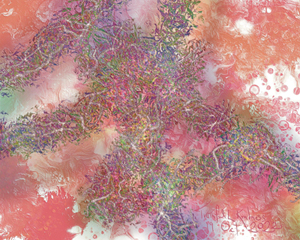.This entry is written by Truthful Loving Kindness (yes, that is my full legal name) for publishing at http://www.truthfulkindness.com , so PLEASE address any questions or comments to that website, regardless of which website shows these words. Husband warns me that part of this entry is TMI (Too Much Information).
“Dementia is a risk factor for epilepsy.” per Epilepsy and Behavior Oct 2020 >> https://pubmed.ncbi.nlm.nih.gov/32693380/ ...
“… In patients with Alzheimer’s disease (the most common form of dementia), approximately 10-22% have at least one unprovoked seizure.” … ”
Seizures in Alzheimer’s disease are more likely to occur with early-onset disease …” and also
“… the presence of cognitive impairment may impede an accurate diagnosis of seizures.”
— per Drugs and Aging 2003 >> https://pubmed.ncbi.nlm.nih.gov/12964886/ .
.
We are still not sure that these “cognitive events” i experience are actually nocturnal seizures, but it makes sense that they are. My sleep-deprived EEG was “abnormal” but impaired by the technicians whispering during my entire test, while they wanted me to “sleep” (not that i could sleep being completely still on my back (as a tummy sleeper, or without my ear plugs, or without my CPAP) — ugggh !!! … so now i am on the waiting list for another specialist (since my cognitive specialist does not deal with seizure issues).
.
For ME, these are my symptoms with “cognitive events”:
Doctor strongly suspected seizures as cause for my sudden onset of memory-loss symptoms at age 41 in 1999, when I had challenges of too much sleeping (early 90s) rotating with no sleep (later 90s) and falling out of bed during sleep. Migraines began and were very frequent during 1990s, but then the head pain stopped. Current doctor theorizes migraines continue, but without the head pain. If so, I suspect they are usually after my cognitive events. Doctor sent me to Univ/Calif for EEG after the big events Feb 1999, but nothing showed. We did not think about the fact that both Feb 1999 events were during naps at work (because I was having extreme fatigue but still trying to work). I was half-asleep during both events during Feb1999. Both events had sound hallucination (sizzling electrical sound), smell hallucination (hot smoking smell) and were followed by several days of bizarre memory symptoms and confusion. (Bizarre” because my memory and confusion symptoms did not show hardly at all until that time). *** Not always immediate to know I had an event.
* Sometimes during the night I have sharp brief head pain, and morning shows symptoms of “event”.
* Sometimes I have what i suspect are nocturnal hallucinations (extremely vivid “dream?” during sleep) with color and smell as well as sight – but feels much more REAL than daytime “reality”
* Often have extreme night sweats with these events, so use mattress pad.
* Sometimes I wake with my tongue in my teeth and blood in my mouth.
* Sometimes I wake with cuts on tongue or inside of cheek.
* Almost always, when I wake after an event I have drooping eyelids similar to migraine (altho almost never have long-lasting head pain like in 1990s).
* Sometimes I have sound or smell hallucinations shortly after waking, or during the next couple days.
* Sometimes when I wake it takes quite a while with my hallucination “reality” as a semi-transparent “overlay” on what I see with my eyes … becoming more transparent until finally the daytime reality is all I “see”.
* Fatigue: Always after an event I wake much more exhausted than when I went to bed. Energy recovery can take anywhere from a few hours to a full week (that is assuming I have no further “events” during that period). Will sleep up to 5 extra hours during first day.
* Almost always I feel more unsteady, needing walker even inside the house, for up to a week after an event.
CONFUSION: After a cognitive event, I always have greater confusion than my current “normal”; Typical “confusion” after cognitive event involves:
* Often had time periods where I could not remember how to get hot or cold water from kitchen tap, so now husband wrote “hot” in bold marker beside that side of faucet, with “cold” written on the other side. The first time this occurred was 1999 after those events, but continued periodically after events until he marked the faucet in kitchen. (Because of this symptom, all bathrooms have separate faucet for hot and cold).
* After an event I am more likely to substitute other things for the toothbrush, or for toothpaste. After one recent event I started to take medication by pouring my drink into my hand (instead of putting pills in my hand).
* Sometimes have “dream-like” quality for hours afterwards (kind-of separated from what is happening in my environment). When this combines with the ultra-reality of night-time dreams or hallucinations, it creates problems of learning and remembering which “reality” is to be APPLIED in daytime relationships.
* Frequently I have several time periods where I appear staring and frozen; I am not asleep, not worrying, and often not even truly “thinking” about anything … but when husband asks, I often say “I don’t know what I was thinking or doing”, or “I want a drink” (but cannot process how to get one), or “I want to feed the dog” (but cannot remember how to do that).
* Seldom but sometimes have what I call “time bubbles” when I am at toilet looking at toilet paper but not recognizing what is on it, or when I forget our address, etc. i suspect these “time-bubbles” caused the first episodes of not recognizing the way my husband looks, altho that is pretty much part of my current “normal” now. My first cognitive “event” (1999) had several time bubbles in following days where I lost memory of recent events, how to spell daughter’s name, etc. But frequently these frozen moments are just what I think of as brain catch-up moments; brain needs a rest, so it just takes a time-out without asking. LOL.
Loads of things can go wrong after a cognitive event, so requires close supervision during first few days after a cognitive event. Obviously, this description is a conglomeration of copy/paste from journal.
.
Non-Personal Notes:
i often hear care-partners speak of involuntary repeating movements of hands, arms, or face.
This might involve involuntary repeated lip-smacking, twitching, chewing, swallowing, picking with fingers, etc. Also the issue of staring into space, unresponsiveness, a sense of detachment from surroundings, or unusual amnesia can be indicators of seizure..
More about these symptoms at https://www.webmd.com/epilepsy/understanding-epilepsy-symptoms .
.
This Link at Epsy Health Blog (https://www.epsyhealth.com/seizure-epilepsy-blog/how-are-dementia-alzheimers-disease-and-seizures-linked) has some good info; “
- Parkinson’s and epilepsy: One UK study found that people with Parkinson’s disease were more than twice as likely to have epilepsy than people without Parkinson’s.
- Alzheimer’s disease and epilepsy: Numerous studies have shown that people with Alzheimer’s are more likely to have seizures. One paper reported that over 40% of people with Alzheimer’s had epileptic activity in their brains.
… and “Dementia seizures may appear as:
- Tonic-clonic seizures: This kind of seizure is most easy to recognize. The person having a seizure will go stiff, fall over and shake on the ground. Learn more here
- Focal seizures: This kind of seizure might be harder to spot. The person having seizures may stop and stare and become confused. They may also behave in unusual ways, such as smacking their lips, twitching or making strange noises. Learn more here
.
“… it is estimated that at least 5-10% of seizures or epilepsy in older individuals (aged > 60 years) are caused by a neurodegenerative dementia. In the vast majority, one of the four following diseases is involved: Alzheimer’s disease, Lewy body dementia, frontotemporal dementia, or vascular dementia. These diseases cause, not only seizures or epilepsy in affected patients, but cognitive, behavioral, and motor disorders as well. As a result, the challenges of treating seizures in older patients with neurodegenerative disease go beyond the usual limitations associated with this age group (i.e., lower fluid compartment, lower protein binding, increased risk of drug-drug interactions) by imposing other issues and pitfalls. .” per Drugs and Aging Mar 2021 >> https://pubmed.ncbi.nlm.nih.gov/33314010/ .
Another Link at https://www.alzheimers.org.uk/blog/what-link-between-seizures-and-dementia .
Dont want to lose this link … for next time >> https://www.epilepsy.com/complications-risks/emergencies/seizure-clusters .
.
 … For early-to-moderate stages i have gathered LINKS for dementia symptoms and Strategies (alphabetized) at >> https://truthfulkindness.com/about/d-info/links-sx-strategies/.
… For early-to-moderate stages i have gathered LINKS for dementia symptoms and Strategies (alphabetized) at >> https://truthfulkindness.com/about/d-info/links-sx-strategies/.
. For more advanced stages Teepa Snow has excellent series called “Making Visits Valuable” beginning at >>… and Listing at https://www.youtube.com/playlist?list=PL2E2lPBsUeBjA1Utglo8q6yANAijEf8cX .
* Admin issues:
SHARE dementia awareness thru buttons below. Subscribe “FOLLOW” button is at the very bottom of the page, with “Category” Links, “Recent Posts” and “Archive”. If you put your eMail address there you should get an eMail each time i write a blog entry. Feel free to leave your thoughts in the form of comments, but please filter your comments with truthful loving kindness to all concerned. … *** … If there is an advertisement below, I have no control over what is shown. My own full legal name is Truthful Loving Kindness. My current diagnosis is still Mild Cognitive Impairment, but my neurologist said I am in a unique position for helping because I have “one foot in each door”. Text Copyright © Truthful L. Kindness on 23Oct2022. 146kb “Cognitive Event” copyright Truthful Kindness on 19Oct2022. Created on iPad ProCreate application primarily using Alaina Jensen’s Acrylic brushes.
*** i dont mind re-posting of things i write, but if you re-post then i expect you to make it clear this is NOT written by you. My authorship as Truthful Kindness (my legal name) must be clearly identified, and provide very prominent Link to my website so that questions and comments can be addressed to ME personally at http://www.truthfulkindness.com . .
Tags: alzheimers, dementia, epilepsy, person with dementia, PLwD, seizure, symptoms. S&S categ: health risk, .
…
.





What great information Tru. Thanks for sharing!
LikeLiked by 1 person
The universe finally aligned for me to find someone who just described my symptoms, I do have a few more than what’s listed. Dealing with neurologist for the last 7 years that have no clue for diagnosis is mind blowing, pun intended. I look forward to following you on this journey. Peace
LikeLike
Thanks for contacting me Cindy Eller. ❤
LikeLike